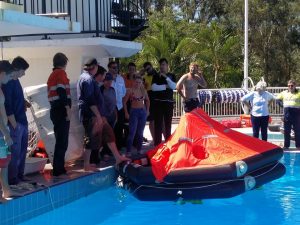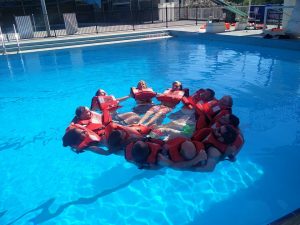Elements of Shipboard Safety (ESS Training)

ESS Training
Description
ESS training reflects the work required by people who wish to work on commercial vessels in Australian waters. You will need to complete the following shipboard safety units of competency as required by the Australian Maritime Safety Authority (AMSA).
- MARF027 – Apply basic survival skills in the event of vessel abandonment
- MARF028 – Follow procedures to minimise and fight fires on board a vessel
- MARF029 – Meet work health and safety requirements
- MARF030 – Survive at sea using survival craft
ECA Maritime College offer you the ability to learn directly from experienced mariners. This means you will get the most up to date marine industry training and the opportunity to get access to a wealth of information usually only learned through years of experience.
We want you to be the best you can be, and have the knowledge and tools to help get you to get the job of your dreams.
PREREQUISITES CHECKLIST
- Be at least 16 years when the certificate is issued
CAREER OPPORTUNITIES
People interested in furthering their maritime career.
DURATION
Classroom – 2 days
ELEMENTS OF SHIPBOARD SAFETY CERTIFICATE ESS COURSE STRUCTURE
Day 1 – First half of the day is in the classroom with the afternoon session in the swimming pool, please ensure you bring a change of clothes as you must be fully clothed for the pool activity.
Day 2 – First half day is in the classroom with the second half of the day practical component, firefighting, flare demonstrations and on board a vessel to see all the safety components of a commercially registered vessel. Please make sure you wear long sleeved shirt, long trousers and enclosed shoes.
Duration
The ESS course is delivered over 2 days.

Huddle
Course Structure – Class Times – 8.00 a.m. – 4.00 p.m.
(Please be on time, as class will start at 8.00 a.m.)
What to bring;
- Boots/covered in shoes (Day 1 & 2)
- Sun protection (Day 1 & 2)
- Swimmers (Day 1)
- Towel (Day 1)
- Long sleeved shirt & trousers (Day 1 & 2)
- Change of clothes (Day 1)
To complete the practical assessments throughout the course you will be required to swim, extinguish fires, visit a commercially registered vessel and activate a hand held flare. Please let us know if you have any issues with any of these practical components of the course.


